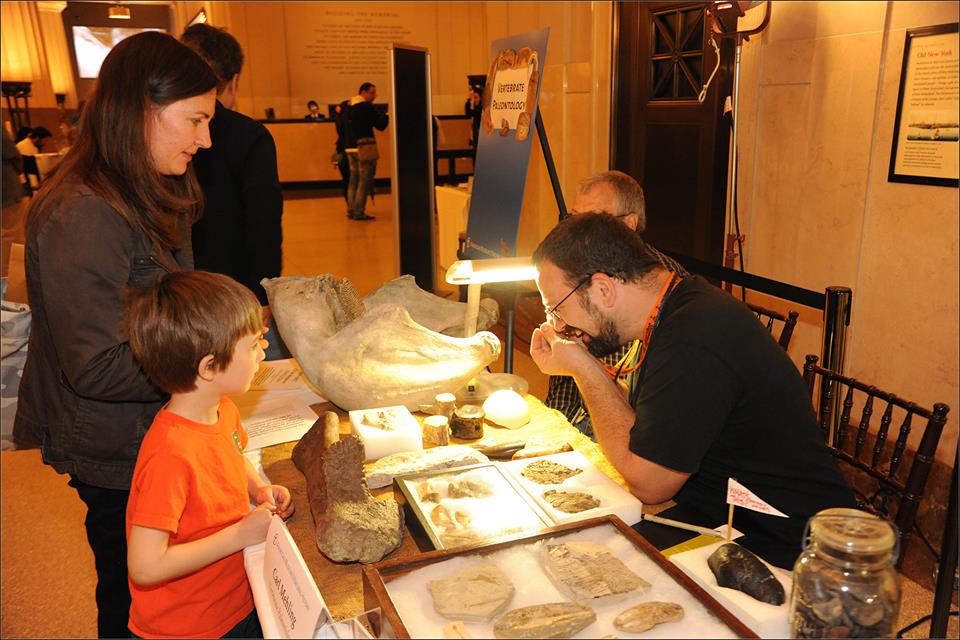Travel
TravelLab: Adults take over science museums when night falls

Sometimes, in the middle of the night, nocturnal creatures are allowed to roam the halls of New York’s American Museum of Natural History, free from shouting and swarming children. (Photo: American Museum of Natural History/Facebook)
NEW YORK — Sometimes, in the middle of the night, nocturnal creatures are allowed to roam the halls of New York’s American Museum of Natural History, free from shouting and swarming children. They are adult humans, known to sometimes quietly contemplate science with a cocktail.
“If you go to a natural history museum during the day, it’s definitely a space for people who are under 4 feet tall. And that’s clear in every way — from the soup they serve at the cafeteria to the height of the label,” said Victoria Cain, a museum historian at Northeastern University in Boston. “It’s kind of fun to reclaim that space for adults.”
On a recent June evening, 175 grown-ups signed up for a slumber party at the New York museum, which has capitalized on the hype created by Ben Stiller’s “Night at the Museum” franchise. The museum’s first sleepovers were aimed at kids. Then in 2014, people 21 and up were invited to explore its darkened exhibit halls.
The experiment was so popular that other science centres followed suit. Aquariums and museums in Atlanta, Milwaukee, Portland, Oregon, and elsewhere have hosted pajama parties for grown-ups. And they’ve become a hot ticket, according to Cain.
“When I saw that we could do it and that there was also alcohol, we were like, ‘Oh my gosh. Someone read our diary,”’ said Janine Agarwal, 29, who attended the sleepover at the American Museum of Natural History to celebrate her husband’s birthday.
THE EXPERIENCE
During the night, guests have dinner in a room full of moon rocks and a 15-ton meteorite, and can wander around the 45 permanent exhibition halls. They can also join guided tours, visit the planetarium, meet with curators and chat with museum scientists about their research — all while the city rests.
“I don’t think there’s any way you’d be able to experience this place in such a special way as doing this kind of overnight,” said Giancarlo Bruni, of Toronto, as he played with the control panel of a full-size submarine. “It’s phenomenal.”
While only adults are allowed, there is still childish fun to be had. Monica Seebohm and her friend Renee Brown came in hooded T. rex onesies.
“We’re always looking for some adventure, and we thought bringing a dinosaur costume was appropriate,” Seebohm said. “We like to dress for the occasion.”
Lights go out at 2 a.m. People can sleep in their own sleeping bags or the museum’s cots, aligned right below the belly of a 94-foot-long blue whale that hangs from the ceiling of the Hall of Ocean Life. Those who feel restless can get cookies and coffee at the Hall of Planet Earth.
Michael Nedell, 53, recalled being afraid of the whale as a child.
“When I was younger, that blue whale freaked me out. I’d been scared of (it) until I grew into a teenager,” he said. “Now I get to sleep under her.”
THE SCIENCE BEHIND IT
Silence greets those who venture into remote exhibits. That stillness makes a difference for visitors hoping to learn something, said biologist John Karavias.
“During the day, you’re fighting crowds. You feel like you’re being rushed and all you’re doing is getting an ‘Ooh!’ and an ‘Ah!’ but you’re not learning,” said Karavias, who studies the effects of climate change on marine life. “When you go to these at night, all the background noise is quieted down and you’re able to digest the science behind everything that you’re looking at.”
He was recently invited to show off acrylic bowls filled with weird-looking sea stars and sea urchins. Bright red spikes covered the body of one big star. Another one had arms so thin that they looked like noodles.
Some visitors were awed; others recoiled when they touched the marine creatures.
Starfish like these depend on a healthy ocean to survive, Karavias explained. But carbon dioxide from the burning of coal and natural gas is making the ocean more acidic. That means sea urchins, mussels, corals and other organisms have a hard time creating their shells or skeletons, which affects their development.
A few floors above, tour guide Arlene Katz taught visitors about animals that glow.
She approached a tank with an eel snuggled in the rocks. Its camouflaged body was hard to pick out from the sandy bottom. But an ultraviolet film made it glow greenish-blue. It’s not making its own light, like a firefly does. Instead, it absorbs light and releases it as a different colour that’s invisible to predators but obvious to other eels.
“It’s a hidden language,” she explained. “Sometimes you gotta hide and sometimes you gotta show off. They’re doing it simultaneously. It’s a brilliant solution.”
Katz said the sleepover is an opportunity for guests to be surprised by nature. “We want people to have so much fun that they almost forget they’re learning,” she said. “But this is not an amusement park. We are sneaking in a lot of information.”
If You Go…
AMERICAN MUSEUM OF NATURAL HISTORY: Central Park West and 79th Street, New York. Adult sleepovers are offered several times a year. The next one is Sept. 21, $350 per person.
ELSEWHERE: Other science centres and institutions also organize adult slumber parties. New York’s Bronx Zoo provides tents for camping on its grounds. The Science Museum of Minnesota will hold a Zombie Adult Camp-in Oct. 26. The Chabot Space Science Center in Oakland, California, will host adults in August to view the Perseids meteor shower.





















